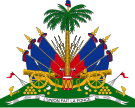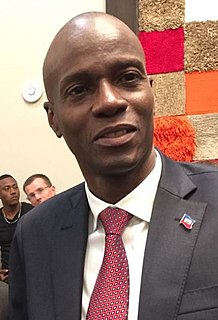
François Duvalier, also known as Papa Doc(Daddy Doc), was the President of Haiti from 1957 to 1971. He was elected president in 1957 on a populist and black nationalist platform. After thwarting a military coup d'état in 1958, his regime rapidly became totalitarian and despotic. An undercover government death squad, the Tonton Macoute, killed opponents indiscriminately, and was thought to be so pervasive that Haitians became highly fearful of expressing dissent, even in private. Duvalier further sought to solidify his rule by incorporating elements of Haitian mythology into a personality cult.
Matthieu Prosper Avril is a Haitian political figure who was President of Haiti from 1988 to 1990. A trusted member of François Duvalier's Presidential Guard and adviser to Jean-Claude Duvalier, Lt. Gen. Avril led the September 1988 Haitian coup d'état against a transition military government installed after Jean-Claude Duvalier's 1986 overthrow. He was President until March 1990, in a period which according to Amnesty International was "marred by serious human rights violations". He was arrested in 2001, but released in March 2004 after the 2004 Haitian coup d'état overthrew Jean-Bertrand Aristide.
Duvalier is a surname, and may refer to:
Simone Duvalier, also known as Mama Doc, was the wife of Haitian leader François "Papa Doc" Duvalier and the First Lady of Haiti.
Jean-Jacques Honorat was named prime minister of Haiti after the 1991 coup. Haiti's third Prime Minister, Jean-Jacques Honorat, came to the post after the 1991 coup which deposed President Jean-Bertrand Aristide and his appointed Prime Minister, René Préval. Honorat, born on April 1, 1931 in the nation's capital, succeeded to the post under the new, provisional President, Joseph Nérette, but, like many others on the list of 17 since 1988, Honorat's stint would be short-lived and terminated after corrupt military interference. He'd spent eight months in office before resigning. He also served with honor from October 1991 to the end of the year as Minister of Foreign Affairs and Worship.

Pierre-Eustache Daniel Fignolé (1913–1986) was a Haitian politician who became Haiti's provisional head of state for three weeks in 1957. He was one of the most influential leaders in the pre-Duvalier era, a liberal labor organizer in Port-au-Prince so popular among urban workers that he could call upon them at a moment's notice to hold mass protests, known as "woulo konpresè"—Haitian Creole for "steamroller."

Michèle Bennett is the former First Lady of Haiti and the ex‑wife of former President of Haiti, Jean‑Claude Duvalier. They fled to France together when he resigned in 1986; they divorced in 1990.

A constitutional referendum was held in Haiti on 14 June 1964 alongside general elections. The new constitution made President François "Papa Doc" Duvalier President for Life, with absolute power and the right to name his successor. It also changed the country's flag from blue and red to black and red, with the black symbolising the country's ties to Africa.

A presidential referendum in Haiti was called in 30 April 1961 —jointly with the parliamentary election— to determine whether to let president François Duvalier remain in office for a further six years. The official count was 1,320,748 votes in favor of Duvalier and none against. The New York Times wrote about the referendum, "Latin America has witnessed many fraudulent elections throughout its history but none has been more outrageous than the one which has just taken place in Haiti."

General elections were held in Haiti on 22 September 1957. Former Minister of Labour François Duvalier won the presidential election running under the National Unity Party banner, defeating Louis Déjoie, as well as independent moderate Clement Jumelle, who had dropped out on election day in a cloud of suspicions that the army was monitoring the election in favour of Duvalier. Former head of state Daniel Fignolé, considered a champion of poor blacks, was considered ineligible as he had been forcibly exiled months before the election, allegedly kidnapped.

A constitutional referendum was held in Haiti on 22 July 1985. The amendments to the new constitution would restore multi-party politics, although only on the condition that all parties swore allegiance to President Jean-Claude Duvalier, as well as re-confirming Duvalier as President for Life and allowing him to single-handedly appoint the Prime Minister and his successor. The changes were reportedly approved by 99.98% of voters, although it was widely considered a sham and led to Duvalier being overthrown the following year.

The 1987 Haitian general election took place on 29 November 1987, with a second round planned on 29 December. In these elections voters would have to elect the President, 77 deputies and 27 senators.

Parliamentary elections were held in Haiti on 30 April 1961. They followed the dissolution of Parliament by President François Duvalier and the abolition of the Senate, making the Chamber of Deputies a unicameral body. Duvalier's National Unity Party won all 67 seats in the elections, which were later re-interpreted as presidential elections in order to give Duvalier a six-year presidential term and avoid the need for scheduled presidential election in 1963.

Parliamentary elections were held in Haiti on 12 February 1984. All but one of the candidates were members of the National Unity Party (PUN) of President Jean-Claude Duvalier. The PUN subsequently won all 59 seats.

Parliamentary elections were held in Haiti on 11 February 1973. Over 300 candidates contested the election, all of whom were members of the National Unity Party and supporters of President Jean-Claude Duvalier.
The Anti-Duvalier protest movement was a series of demonstrations in Haiti from 23 May 1984 – 7 February 1986, that led to the overthrow of President Jean-Claude Duvalier and the Duvalier dynasty regime.

The Duvalier dynasty was an authoritarian family dictatorship in Haiti that lasted almost twenty-nine years, from 1957 until 1986, spanning the rule of the father and son pair François Duvalier and Jean-Claude Duvalier.
The National Unity Party is a political party in Haiti. It was the de facto only political party in the country during the Duvalier dynasty, an authoritarian family dictatorship of François "Papa Doc" Duvalier and his son Jean-Claude "Baby Doc" Duvalier, which lasted from 1957 to 1986.

Parliamentary elections were held in Haiti on 14 June 1964, alongside a constitutional referendum. The National Unity Party of President François Duvalier was the sole legal party at the time, with all other parties having been banned the previous year.








